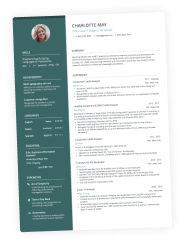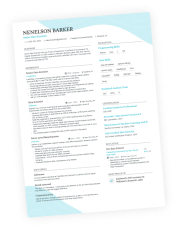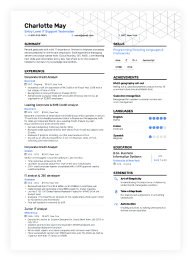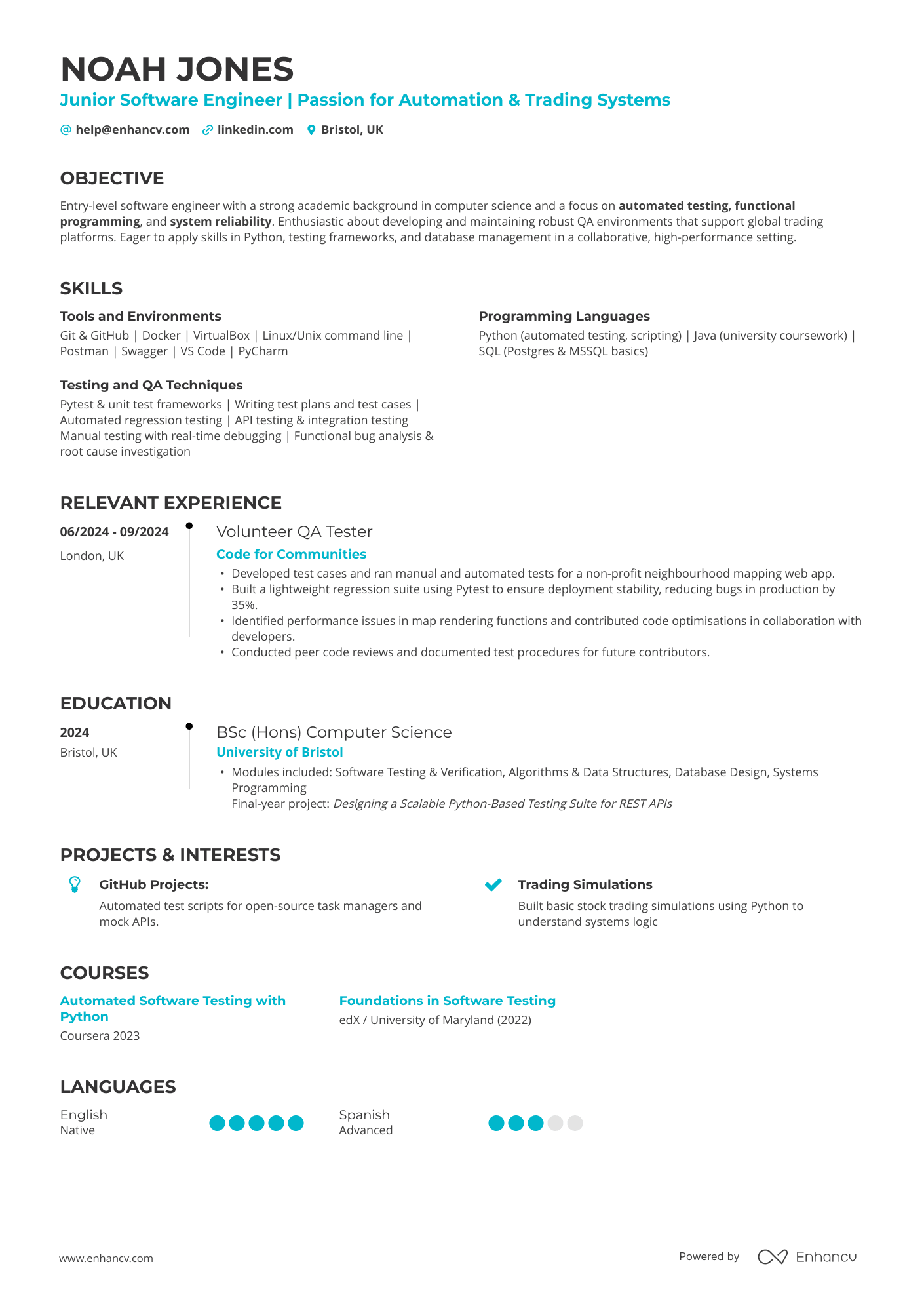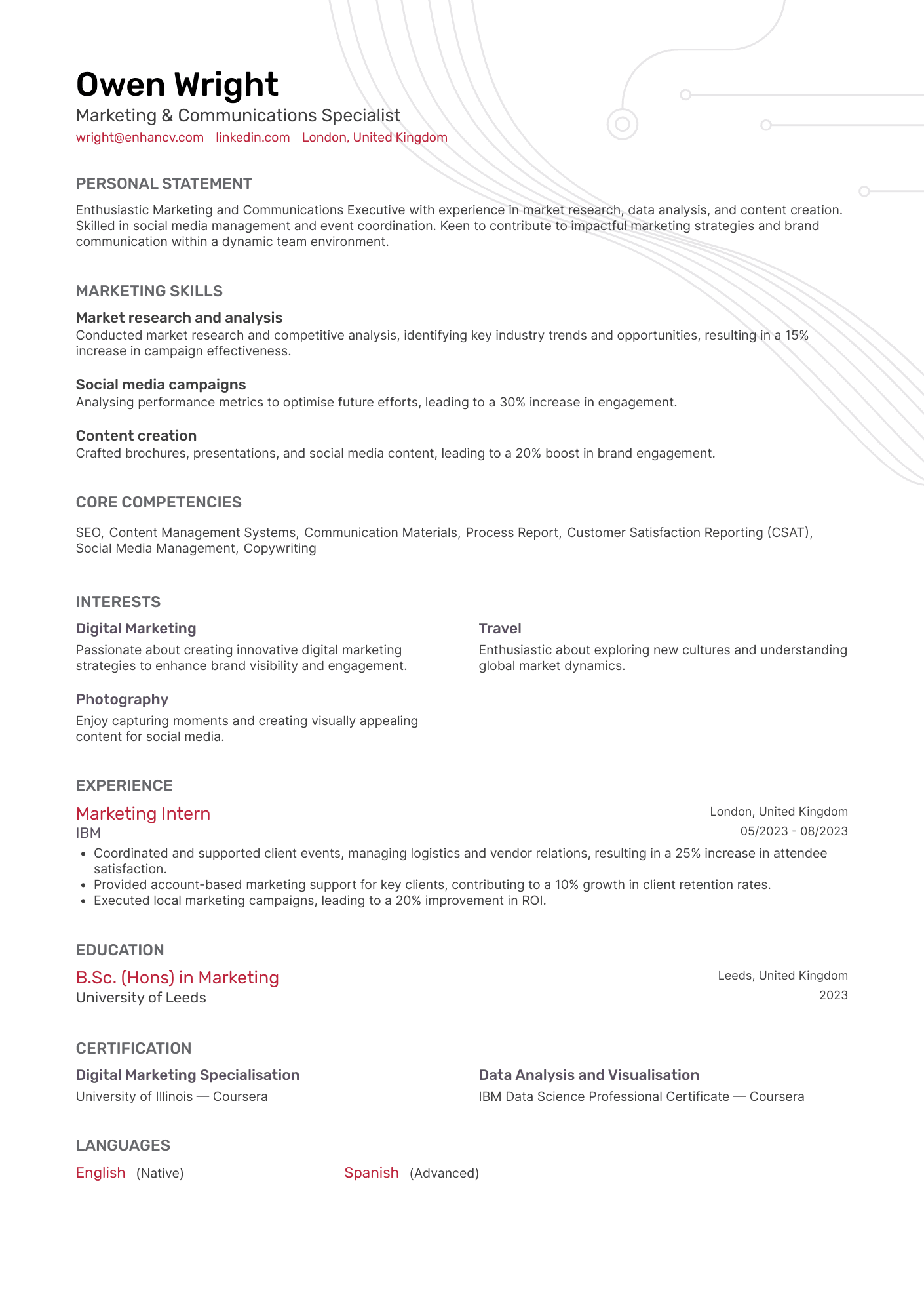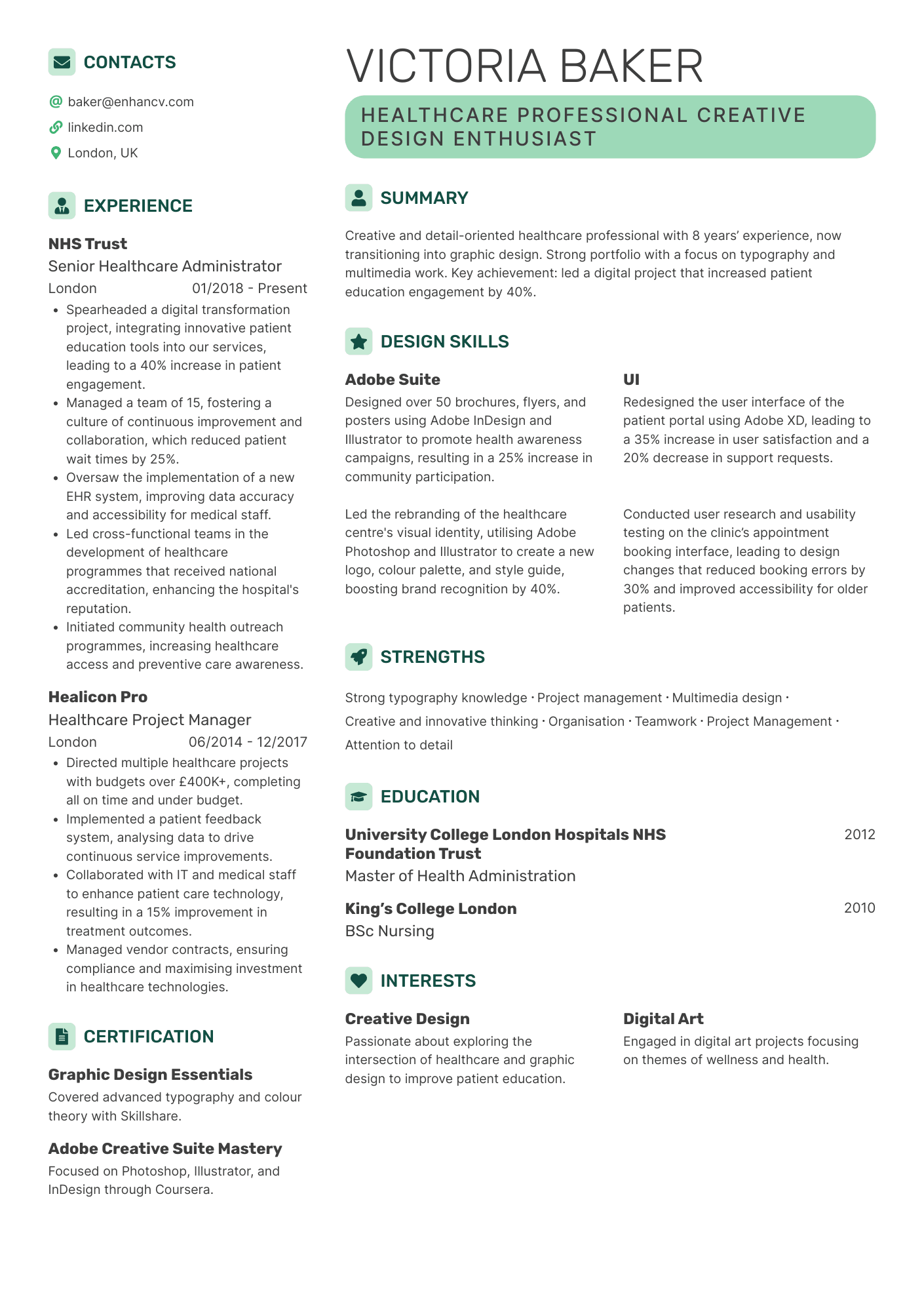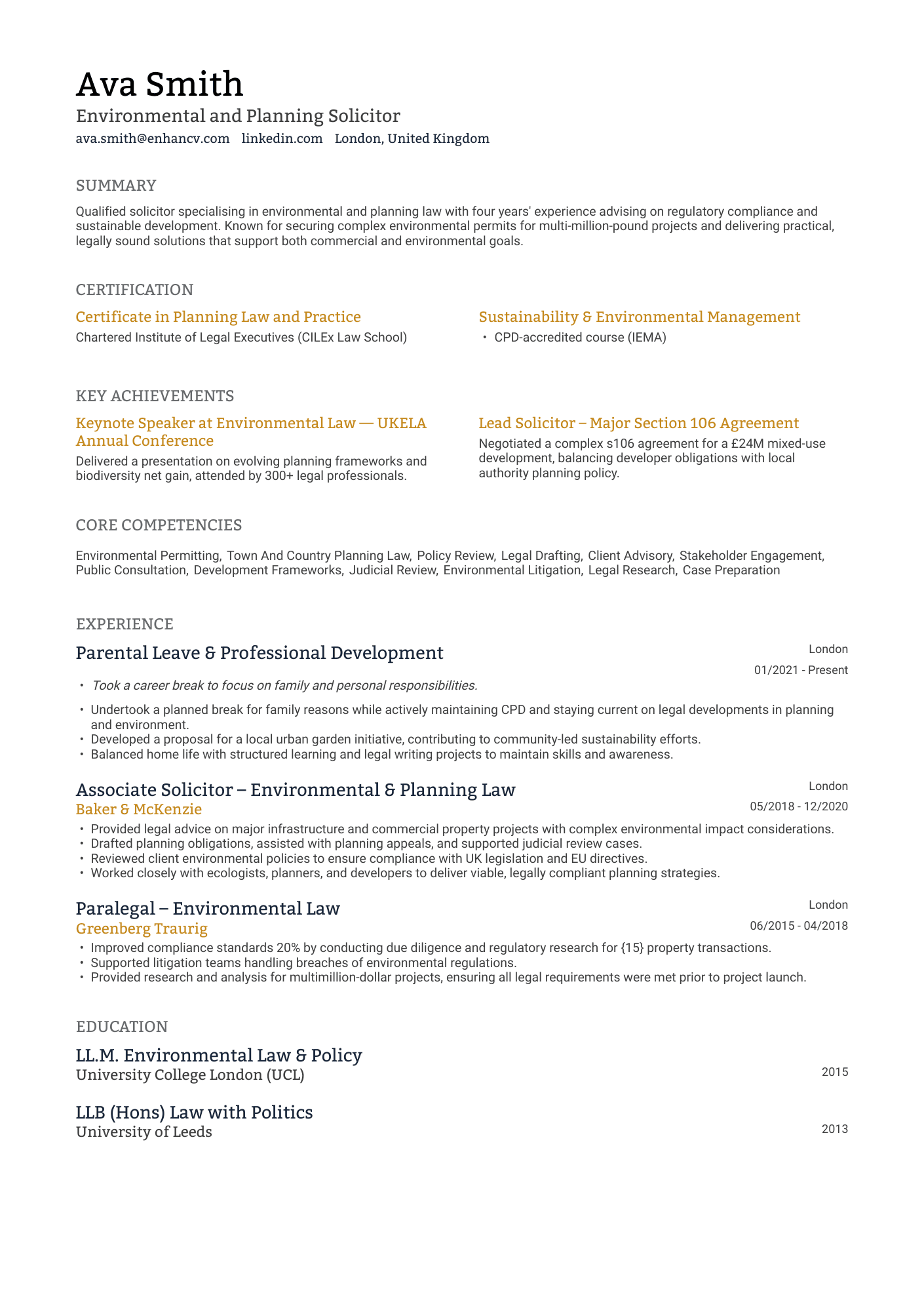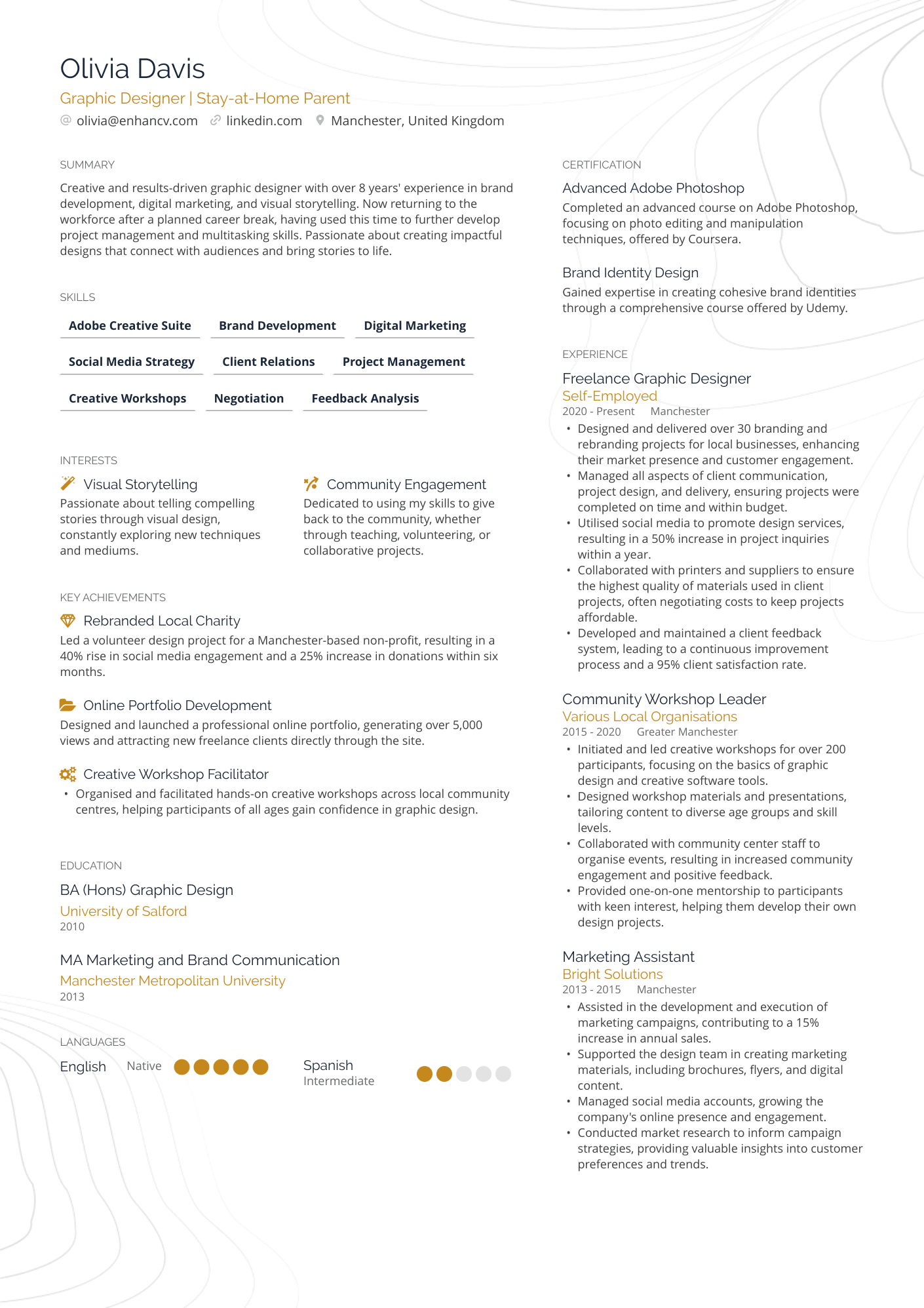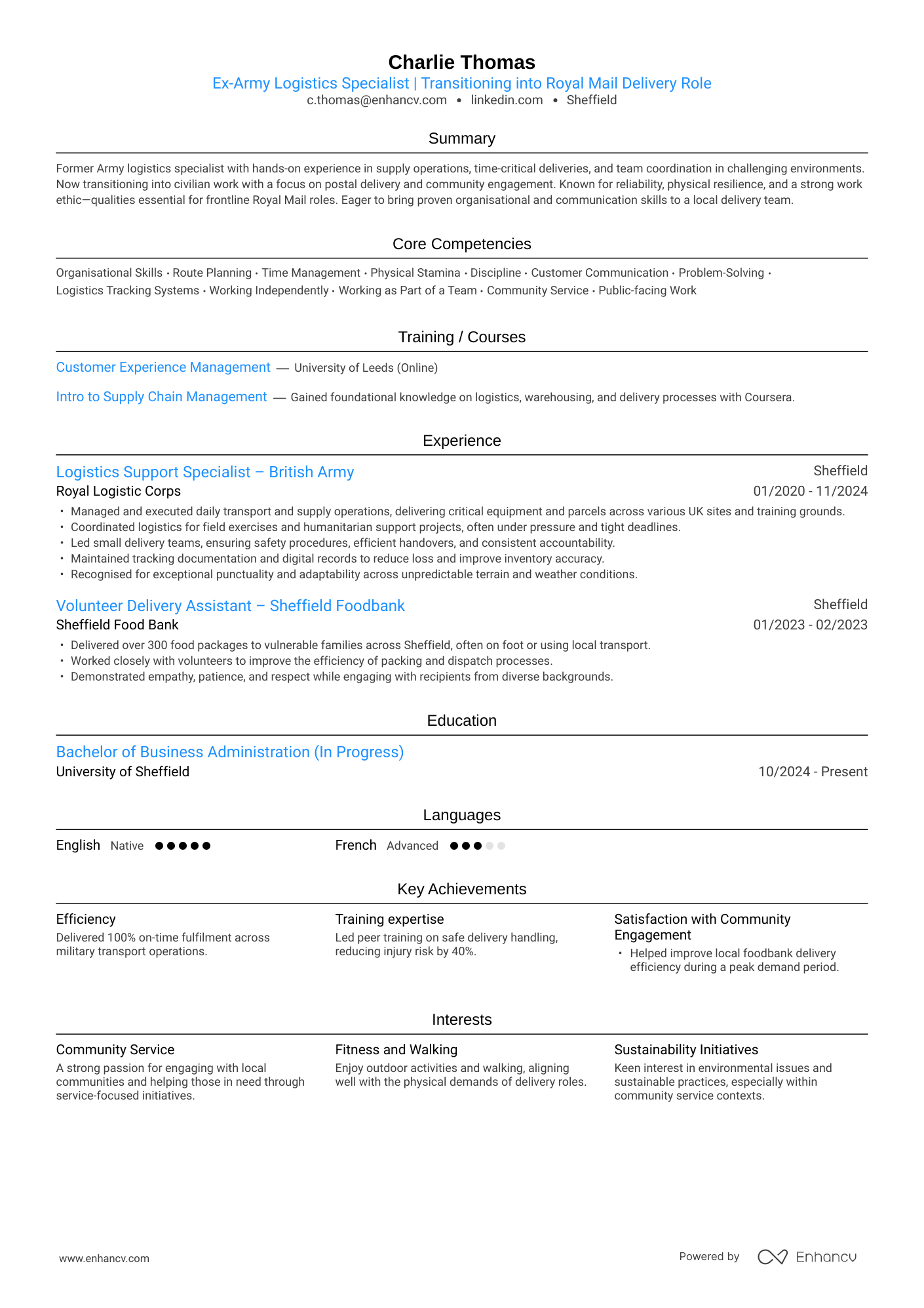Does your diverse skill set get overlooked in a traditional CV format?
You might just be using the wrong structure to let your strengths shine. When your experience doesn’t follow a straight path, a skills-based CV—also known as a functional CV—can help you stand out.
This format prioritises your abilities and knowledge rather than focusing on job titles or dates. By grouping your skills into clear categories, you help employers see your strengths at a glance.
In this guide, we’ll walk you through the benefits of the functional CV and show how others have used it to land interviews. And if you're ready to build yours, check out Enhancv’s professionally designed CV templates to get started.

Key takeaways
- A skills-based CV spotlights your abilities and achievements rather than your employment timeline.
- Especially useful for career changers and those with employment gaps, this format helps you present yourself as a strong candidate—even without recent or directly related experience.
- If your background spans varied roles or sectors, a skills-based CV unifies your experience under clearly defined skill areas, creating a cohesive narrative.
- It’s also effective for those with limited job history—such as students or recent graduates—who want to spotlight academic or transferable skills.
- Keep your layout clean, concise, and distraction-free to ensure both applicant tracking systems and recruiters can quickly focus on your competencies.
Let’s dive in.
What is a skills-based CV?
A skills-based CV, also known as a functional CV, is designed to highlight your abilities rather than your chronological work history. It’s ideal for situations where your experience doesn’t follow a traditional path, or when you want to shine a light on what you’re truly capable of.
Unlike the classic format that focuses on job titles and timelines, this approach puts your key skills front and centre. These are often grouped under clear headings like Marketing, Tools, Design or SEO, making them quick to scan for both recruiters and applicant tracking systems (ATS).
A typical functional CV follows this structure:
- CV header (your contact details)
- Career statement or personal profile
- Skills section (grouped by relevant themes or categories)
- Supporting work experience and educational background
- Optional extras: certifications, projects, volunteering, languages, or anything else that adds value
This CV organisation is especially useful for career changers, those with employment gaps, or people with a broad, non-linear skill set. It allows you to lead with your strengths and tailor your CV around what you can do, not just where you’ve worked.
Its biggest advantage? Flexibility. You can adapt the layout to suit your experience and focus on what matters most to your next employer. We’ll show you how to customise it later in the article.
Here’s what a skills-based CV looks like when crafted with Enhancv’s CV Builder:
3 benefits of the functional CV format
Wondering how to make your CV stand out in a sea of applications? A functional CV might be your secret weapon—especially if your career journey hasn’t followed a straight line.

How the skills-based format works in your favour
- Puts key skills front and centre: A skills-based CV showcases your most relevant strengths at the top, which is ideal if you're changing careers or have a varied background. It draws the recruiter's eye to what you can do, not just where you’ve worked.
- Reduces the focus on employment gaps: If you’ve taken time out of work, this format helps shift the spotlight away from dates and towards your achievements. It makes it easier to tell a clear, confident story about your capabilities.
- Tailors your experience to the job: You can align your skills with the job description by grouping them under targeted headings. This structure helps demonstrate how your background fits the role, making it easier for recruiters to say “yes.”
As a stay-at-home mom trying to get back into my position as an accountant, I was really worried that my career gap would overshadow my skills. I kept thinking recruiters would just see the time I was away and not all the new capabilities I’d developed. Switching to the functional CV format helped me showcase my strengths more confidently, focusing on what I can bring to the table now. It turned my anxiety into an opportunity to shine.
When to use the skills-based format (with 5 real examples)
Not sure if a skills-based CV is right for you? Here’s when it makes sense and how it can help you present your experience in the best possible light.
First-time job seekers
Starting your career without much work experience can feel daunting. However, a functional CV allows you to spotlight your skills, education, internships, and volunteering, rather than an empty job history. This way, recruiters see your potential right from the start.
Get more expert tips on the topic in our article How to Write Your First CV.
Career changers
If you’re moving into a new field, a traditional CV might not reflect your readiness. A skills-based CV shifts the focus to your transferable skills and achievements, helping you make a strong case, even if your past roles are in a different sector.
Work returners
Whether you’ve taken time off for health reasons, travel, or personal commitments, a functional CV helps you present a cohesive story. Instead of drawing attention to gaps, you can emphasise what you’ve achieved and the skills you’ve maintained.
Stay-at-home parents
Rejoining the workforce after parenting duties? This format allows you to underscore strengths like organisation, multitasking, and managing responsibilities—skills that employers value but might not show up in a traditional work history.
Military
If you’re a military leaver, a functional CV can help you translate army experience into civilian-relevant skills—from leadership to technical training. It’s a powerful way to show how your background fits into a new work environment.
Pros and cons of the skills-based format
A common mistake when using a skills-based CV is choosing it for the wrong reasons. Some jobseekers hope to hide gaps or a lack of direct experience, but when used inappropriately, this format can raise more questions than it answers.
That said, the functional CV has clear strengths, especially when used with the right strategy.
Let’s take a closer look at the advantages and disadvantages:
Skills-based CV pros and cons
| PROS | CONS |
|---|---|
| Highlights skills and abilities over job titles—ideal for career changers. | Lack of detailed job history can make career progression unclear. |
| Helps minimise the focus on employment gaps or short-term jobs. | May raise red flags for some recruiters, especially in traditional industries. |
| Allows you to showcase relevant accomplishments that align with the job you’re applying for. | Often less compatible with applicant tracking systems looking for chronological data. |
| Flexible layout that suits non-linear or unconventional career paths. | Makes it harder for employers to verify previous roles and performance. |
Knowing how and when to use the functional format can make a real difference in your job search. It’s a powerful tool for underlining your strengths, but it’s not always the best fit. If your work history is stable and closely tied to the job you’re applying for, a reverse chronological CV may be more effective.

PRO TIP
A skills-based CV doesn’t mean leaving out your experience entirely—it simply shifts the focus. Always include a brief work history and use measurable results to back up your skills. Recruiters still want evidence of impact, even if it’s not presented in a traditional format.
How to write a skills-based CV step by step
The skills-based CV stands apart from traditional formats, and that can work in your favour. By placing your education and work history towards the end, you lead with your strengths and give recruiters a clear view of your abilities before anything else.
Here’s how to build a functional CV from the top down:
CV header
Your CV header sits at the very top and serves as the first point of contact. Keep it simple, clear, and professional.
What to include:
- Name and job title
- Location (city or region is enough)
- Professional email address
- Links to a portfolio, LinkedIn profile, or personal website if relevant
You can use subtle colour contrasts or a larger font for your name to help your CV stand out—just keep it clean and readable.
Should you add a photo?
In the UK, it’s best to avoid including a photo, unless you’re in a field where visuals are essential (like modelling or acting). It helps keep the focus on your skills and reduces the risk of unconscious bias.
Look at this example taken from a real-world nursing CV:
CV summary or objective
Next up is your professional profile—a short introduction at the top of your CV that gives recruiters a sense of who you are and what you’re aiming for. This section sets the tone, so it’s worth getting right.
There are two common options:
- A career summary: best for experienced professionals.
- A CV objective: more suitable for entry-level candidates or career changers (often the better fit for a skills-based CV).
Here’s how to write yours:
- Keep it brief: A summary should be around three to five sentences, highlighting your top strengths and career direction. If you’re early in your career or changing fields, go for an objective statement instead—two or three focused lines outlining your goals and relevant abilities.
- Use confident, clear language: Choose strong adjectives and begin sentences with active verbs. Avoid writing in the first person (“I” or “my”) to keep the tone professional and balanced.
- End with impact: Your final sentence should show motivation and intent—leave recruiters curious to learn more.
Here’s how an aspiring store manager’s CV objective can look:
Skills section: the heart of your functional CV
In a skills-based CV, this component is the most important. It’s where you show what you can do, not just what job titles you’ve held.
Here’s how to get it right:
- Group your skills into clear categories: Start by identifying your key strengths and grouping them into three to five categories. These might include technical (hard) skills and interpersonal (soft) skills, depending on the role.
- Tailor your skills to the job: Research the job you’re applying for and align your capabilities with what the employer is looking for. The more relevant your skill set, the better your chances of passing both the recruiter review and the ATS scan.
- Back your skills with evidence: Simply listing skills won’t be enough. Use short bullet points or subheadings to show how you’ve applied each skill, ideally with measurable results. You can include these details here or support them further in your summary or work experience section.
This skills section makes a great addition to a functional CV because it not only lists relevant skills but also provides specific, quantified achievements that demonstrate proficiency and impact. Contextualising each skill with real-world applications emphasises your capabilities and contributions, making a compelling case for your suitability for the job.

PRO TIP
Enhancv’s CV Builder gives you the flexibility to customise and reorganise your skills to suit your career story. You can put them within CV sections like Achievements or Additional Experience, and even personalise titles and icons to match your style. This helps your CV stand out by showcasing your strengths and results, rather than just listing skills in isolation.
Work experience section
Even on a skills-based CV, your work experience still matters. It provides context for the competencies you've highlighted above and shows employers where and how you’ve put those skills into practice.
Here’s how to format your experience section effectively:
- Job title and company: Clearly state your role and the organisation you worked for.
- Dates of employment: Include the month and year for both the start and end dates. If you're still in the role, write “Present”.
- Role description (optional): Add a brief line about your responsibilities—especially helpful if the company is a startup or not widely known.
- Bullet points: Include three to five concise bullet points outlining your key duties and contributions. Focus on achievements where possible, and use data or percentages to show your impact (e.g. “Reduced onboarding time by 30%”).
- Use action verbs: Begin each bullet with a strong verb to underscore your initiative and drive (e.g. led, streamlined, improved, delivered).
Here’s an example of how this section might look for someone returning to work after a career break:
- •Immersed in diverse architectural styles and techniques to broaden design perspectives and expertise.
- •Participated in workshops and collaborated with renowned architects and artists to refine creative and technical skills.
- •Conducted a comparative study of historical and contemporary architectural works across various regions of Spain.
Education section
Your education section should always be tailored to the job you’re applying for. If you’ve completed specific modules or projects that developed relevant skills, be sure to include them. The more aligned your education is with the role, the higher it should appear on your CV—especially if you’re early in your career.
Here’s what to include:
- Degree and subject: Start with your highest qualification (e.g. BA, BSc, MSc) and your field of study.
- University or college: Include the full name of the institution.
- Location: Mention the city and country (if outside the UK).
- Graduation date: List the year you graduated. If you're still studying, include your expected completion date (e.g. Expected July 2025).
- Honours and awards: Add any distinctions or achievements, such as First Class Honours, Merit, or academic awards. You can also mention relevant dissertation topics or research if they relate to the job.
- Certifications: Some roles value professional certifications just as much as a degree—especially in technical or hands-on fields. If you hold a qualification that’s highly relevant to the job, give it its own section or list it prominently under your education.
Additional sections
You can also feature extra sections to showcase your value and show how you’ll help the organisation reach its goals. These can strengthen your application by adding more context and personality to your CV.
Here are some examples:
- Projects: Highlight specific projects where you’ve successfully applied key skills—especially those relevant to the role.
- Volunteering: Demonstrate soft skills like teamwork, initiative, and community involvement—especially valuable if you’re early in your career or returning to work.
- Awards and honours: Include any formal recognition for your work or achievements, such as professional accolades or academic prizes.
- Languages: Proficiency in other languages is a real asset, particularly for roles in international companies or customer-facing positions.
Tempted to include client testimonials or references in your CV? It’s best to leave them out. While they can add credibility and support your strengths, they’re more appropriate for your cover letter, portfolio, or to share upon request.

PRO TIP
As with any CV format, everything you include should be tailored to the role. A well-targeted skills-based CV makes it easier for both applicant tracking systems and recruiters to spot your suitability. By focusing on the most relevant skills and achievements, you’ll instantly show how you can meet the employer’s needs—and stand out in a crowded job market.
Free skills-based CV template
Here’s a sample template to help you emphasise your skills and achievements effectively.
For more inspiration, take a look at our skills-based CV templates—while originally designed with US users in mind, they’re easily adaptable to UK CV formatting and expectations.
[Your name]
[Job Title]
Email: [email address]
Location: [location]
Phone: [your phone number]
LinkedIn: [Your LinkedIn Profile URL]
Objective
[Write a brief summary of your career goals and the value you can bring to the target job. Focus on your skills and achievements.]
Skills
Hard Skills
- [Skill 1]: [Brief description or achievement related to this skill]
- [Skill 2]: [Brief description or achievement related to this skill]
- [Skill 3]: [Brief description or achievement related to this skill]
- [Skill 4]: [Brief description or achievement related to this skill]
Tech Skills
- [Skill 1]: [Brief description or achievement related to this skill]
- [Skill 2]: [Brief description or achievement related to this skill]
- [Skill 3]: [Brief description or achievement related to this skill]
- [Skill 4]: [Brief description or achievement related to this skill]
Soft Skills
- [Skill 1]: [Brief description or achievement related to this skill]
- [Skill 2]: [Brief description or achievement related to this skill]
- [Skill 3]: [Brief description or achievement related to this skill]
- [Skill 4]: [Brief description or achievement related to this skill]
Experience
[Job Title]
[Company Name]
[Location, Year(s)]
- [Brief description of your responsibilities and achievements in this role]
Education
[Degree Title, Subject]
[University Name, Graduation Year]
- [Relevant modules, dissertation topic or academic achievements]
Languages
- [Language 1]: [Proficiency level]
- [Language 2]: [Proficiency level]
Other CV formats: choosing what’s right
While the skills-based structure is a great option in certain situations, there are two other common CV formats worth considering—especially if you have a more traditional career path or substantial experience in one field.
Reverse chronological CV
This is the most widely used format, and it’s favoured by recruiters. It lists your work history in reverse order, starting with your most recent role. It’s ideal if you’ve had a steady career progression in a specific industry and want to demonstrate long-term growth and stability.
This format:
- Makes your most recent experience easy to find.
- Highlights promotions and long-term roles.
- Is highly compatible with ATS.
Combination (or hybrid) CV
The combination CV blends the best of both worlds: it begins with a strong skills section, like a skills-based CV, followed by a chronological work history. This layout is perfect if you want to showcase both technical and interpersonal skills, while still giving employers a clear view of your experience.
It works particularly well for roles in:
The best CV format depends on your experience, goals, and the role you’re targeting.
- Choose a skills-based CV if you’re changing careers, returning to work, or have gaps in your employment.
- Go with a reverse chronological CV if you have a clear, consistent work history in your field.
- Opt for a combination CV if you want to showcase both your skills and career progression.
Whatever format you pick, make sure it emphasises your strengths and aligns with the job you’re applying for.
How to format a functional CV
Since the functional CV is often used by those with unconventional paths, it’s especially important to make the layout as clear and traditional as possible. Recruiters may be less familiar with this format, and applicant tracking systems are designed to scan standard structures.

PRO TIP
ATS are now a standard part of the hiring process—used by many employers to sort and rank CVs before a human sees them. While they can feel intimidating, they’re simply scanning for keywords, structure, and relevance. Formatting your CV clearly and tailoring it to the job description helps ensure you make it through the first digital hurdle and into a recruiter’s hands.
To ensure your CV gets read and understood by both humans and software, follow these formatting best practices:

Formatting rules for skills-based CVs
- Keep it to two pages max: Especially if you're early- or mid-career, aim for brevity and clarity.
- Use a clean, readable layout: Choose a simple font like Arial, Rubik, or Volkhov. Use consistent spacing and clear section headings.
- Stick to standard margins: Leave enough white space so your CV doesn’t feel cramped—two cm margins work well.
- Avoid graphics and columns: While they may look appealing, complex formatting can confuse ATS software. Stick to a single-column layout for maximum compatibility.
- Use bullet points: Make your content easy to scan—bullets are ideal for listing skills, achievements, and duties.
- Use an AI CV builder like Enhancv: It takes care of the design for you, keeping it ATS-friendly and professional, so you can focus on writing strong, relevant content. Plus, with AI-powered suggestions, you’ll get instant tips on how to improve your CV and stand out to recruiters.
Is your CV good enough?
Drop your CV here or choose a file. PDF & DOCX only. Max 2MB file size.
Mistakes to avoid with skills-based CVs
A skills-based CV can be powerful—but only if used thoughtfully.
Here are the common pitfalls to watch out for:
- Using it as a cover-up: If you're relying on this format to hide career gaps or a lack of experience without showing how you’ve kept your skills sharp, it may backfire. Employers value honesty and relevance more than perfection.
- Lack of evidence: Simply listing skills like “teamwork” or “problem-solving” won’t cut it. Back each one up with examples, whether from paid work, volunteering, or personal projects.
- Overloading the skills section: Packing in too many skills can dilute the impact. Focus on three to five core skill areas that are most relevant to the job you're targeting.
- Neglecting your work history: Even if it comes later, your employment section still matters. Keep it brief, but clear—include job titles, organisations, dates, and a sentence or two of context.
- Forgetting to tailor your CV: A generic functional CV won’t land interviews. Always tailor your content to the job description, using the same language and priorities the employer uses.
Key takeaways
The skills-based CV, while less traditional, offers a unique way to underscore your skills and experiences. It’s especially valuable when your career path isn’t linear, or when you want to shift the focus from job titles to what you’re truly capable of. With the right structure and evidence to support your strengths, a well-crafted functional CV can be just as impactful—and interview-worthy—as any chronological format.

